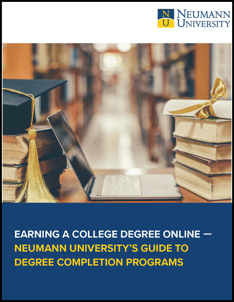
Military veterans who are returning to civilian life face many unique challenges. And if you're a veteran going back to college for a four-year degree, you may be wondering how exactly you're going to pull it off.
Although you may have some concerns about going back to college, you should know that you're not alone. In fact, in 2018, more than one-third of college students (7.6 million), in four-year undergraduate programs, were adults. This number is expected to grow another eight percent between now and 2026.
At Neumann University, we want to make going back to college an easy and painless process – especially for non-traditional students. That's why we're proud to offer degree completion programs for adult learners. Here are some tips we've compiled for military veterans who are going back to college to complete a four-year degree.
1. reflect on one very important question:
Do I want to go back to college to finish my degree?
Before you make the decision to enroll in a degree completion program, you need to make sure that you're prepared to put the time, money, and energy into completing your four-year degree. As an adult learner, you should be prepared to be challenged, both personally and intellectually.
So, if you're committed to the challenge of going back to college, then you should also know that you're about to open yourself up to a variety of opportunities. You should be proud of yourself, so take a moment to celebrate your dedication to excellence.
Also, check out these few resources for more inspiration:
- Degree Completion Programs: What They Are and Why They Matter
- Back to School: Options for Adult Learners Seeking a 4-Year Degree
2. Seek Financial Aid Options:
Even though you may qualify for GI benefits, you can and should still apply for financial aid! By the way, there's no age limit when applying for outside scholarships. As long as you meet the qualifications, you can apply.
To help get you started on your financial aid search, here are a couple of resources for you to consider:
- Free Application for Federal Student Aid (FAFSA)
- Scholarships.com
- Chegg.com/scholarships
- [BLOG] 6 Financial Aid Options for Adult Learners in Degree Completion Programs
3. Explore Veteran Support Groups:
Remember that asking for help is not a sign of weakness. It shows strength to realize your limitations and reach out to others for support.
In fact, there are both private and public, in-person and online organizations across the nation that offer support to veterans and their families. These organizations can offer extra benefits and services at a low to no cost as well as provide a welcoming environment where veterans can meet with each other and take part in professionally led support groups.
We invite you to take a look at just a few of the many veteran support groups out there:
4. use your existing time management skills:
As a veteran, you probably have a good grasp of time management. Once enrolled in a degree completion program, though, you may have a hard time prioritizing your time on your own — especially if you're going to work while you're getting your four-year degree. So, get a hard-copy planner, use your phone's calendar, or download an app to help you stay on track: Do whatever works for you.
And if you're really struggling with your work load, don't hesitate to reach out to a faculty member or to a school counselor. Their job is to help non-traditional students and adult learners succeed!
Here are a few blog articles with tips and advice for you:
- 7 Tips for Non-Traditional Students Going Back to College
- You Should Work While Completing Your Degree — Here are 3 Reasons Why
5. Look to the future & get excited:
The research is overwhelming: Holding a four-year degree is important for professional advancement. When weighing the value of a high school diploma or some college credit, against a four-year degree, research is clear that an undergraduate degree outperforms in every area of consideration.

And it's no secret that college graduates can expect to make a better salary than those without a four-year degree. According to a 2013 study by the Pew Research Center, the difference in median annual earnings between millennial high school and college graduates stands at $17,500. According to the Federal Reserve Board of San Francisco, a college graduate can expect to earn $800,000 more on average, by retirement, than a high school graduate who doesn’t go on to pursue a bachelor’s.
6. Explore NEUMANN'S DEGREE COMPLETION PROGRAMS:
At NU, we know that you are making big sacrifices to return to school and finish your degree. Our unique degree completion programs honor your sacrifices through its flexible online learning model, dedicated and experienced faculty, supportive admission staff, affordable tuition and financial assistance, and quality four-year degree delivered in an accelerated format.
Are you looking for community safety careers or leadership positions in business? Explore our degree completion programs and pick the one that's perfect for you!
Transform your future today:
At Neumann University, our community is alive with intellectual energy and creativity. The Faculty who teach the courses in the degree completion program are experts with real-world training and field experience, many of whom are still working in their specific industries.
If you're interested in learning more about NU's degree completion programs, we encourage you to contact us today!
 CHALLENGE
CHALLENGE




.jpeg)







